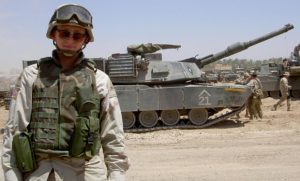Midway upon the journey of our life
I found myself within a forest dark
For the straightforward pathway had been lost.

Ah me! how hard a thing it is to say
What was this forest savage, rough, and stern,
Which in the very thought renews the fear.
So bitter is it, death is little more;
But of the good to treat, which there I found,
Speak will I of the other things I saw there.
Dante’s Inferno, Canto I
We begin our descent
In the first part of our seminar, we will consider two different images of Hell: War and existentialist Angst (one version in a world where God is dead versus a contrasting image in a world where He is alive).
Because this is a social science seminar, I will begin with a complex term which, at first glance, doesn’t seem like it should be complex at all: description. What do we mean when we describe something? What does a good description look like? Why do people disagree over an exercise that seems so simple?
From this day onward, you should devour all of the readings on this syllabus. In addition to the required books, please remember to bring copies of both the assigned readings marked “PRINT” as well as hand-outs to class. You must have the required readings in front of you so we can have a robust discussion.
1. Tuesday, January 16
Discussion Topic: Why is the idea of Hell a significant part of our daily lives? Why do we use the term so frequently?
Today, I will outline my goals and the structure of this course. I will also conduct a class survey.
Assignment: On Thursday, we will begin our discussion of Roy Scranton’s provocative book, War Porn, as well as a short selection from the Catholic Catechism on “Hell.” As you read Scranton’s book, think about the following theme: According to Scranton, “war is hell because . . .” Then, write a brilliant introductory sentence and two equally brilliant follow-up sentences that address this theme.
The purpose of this exercise is to begin training your mind to formulate effective introductions to papers. Thus, please spend a serious amount of time choosing the best sentences. In particular, imagine that your sentences are the introduction to a paragraph. Why would your sentences grab my attention? Why would the way you have linked them make sense?
This assignment should be typed and double-spaced. NOTE: You should consistently adhere to this rule throughout our course. I’m afraid I won’t be able to read any of your assignments if they aren’t typed and double-spaced.
IMAGE ONE
OUR CONTINUING WAR IN IRAQ I: “War is hell”
2. Thursday, January 18
Discussion Topic: What is Hell? It depends on whom you ask. If we put the Catholic Church and Roy Scranton in the same room, will they understand each other? Will they get along? Will they care?
Roy Scranton, War Porn Read only pp. 1-126.
Article IV, “Hell,” Catechism of the Catholic Church: PRINT AND READ
Today, we start familiarizing ourselves with the terrain of Hell. My personal guarantee: Everything we do as we move through this semester will relate to subsequent segments of the course.
As we begin our readings and discussions, imagine yourself as a collector, picking up different visions of Hell and trying to discern what they are about. Scranton presents us with one image. The Catholic Church provides a different one. We will encounter many more.
Assignment for next Tuesday:
This section of our course is devoted to Description. How does Roy Scranton attempt to describe war in the fullest sense? Please write a paragraph of no more than 5 sentences in response to this question. In writing this paragraph, you should think hard about the meaning of “fullest sense.”
Imagine you are writing an introduction to a long essay. What should a great introductory paragraph should do. Please spend lots of time making this paragraph the best one you can imagine writing. Note: Anyone can write a paragraph. It is hard to write a great one.
In addition, please include a question for Roy Scranton’s visit on Thursday.
3. Tuesday, January 23
Discussion Topic:
Finish reading Roy Scranton’s War Porn
READ this article about PTSD: “War is Hell, and the Hell Rubs Off”
Consider these three issues: 1) What is war like in all of its manifestations? 2) What does war do to people? 3) How should we choose the appropriate words and sentences to capture the topic of war? I also encourage our discussion leaders to come up with even better questions.
4. Thursday, January 25
Class Visit by the author: Roy Scranton
Roy Scranton, “Back to Baghdad,” Rolling Stone, July 31, 2014 READ
5. Tuesday, January 30
An excursus. From the twenty-first century to the fourteenth century and back. Our goal in today’s meeting is to see how different depictions of Hell reflect the circumstances in which they are created.
Learning is as much about looking at something as about reading and listening.
We will meet for class in the Special Collections Room, first floor of Hesburgh Library. Notre Dame is a powerhouse in Italian studies and has one of the finest collections of Dante’s Divine Comedy. Julia Schneider, the library’s expert on this collection, will introduce us to visual depictions of Dante’s Inferno.
Before we meet, read the following Cantos closely. Also, read the notes so you know what’s going on. The better you understand these Cantos, the easier it will be for you to interpret the artistic depictions that we will see. Make sure you bring them with you.
Canto I: PRINT AND READ
Background Notes: READ
Canto Canto XXIX (plague-like victims): PRINT AND READ
Background Notes: READ and READ
READ: Is Hell Real? Two-thirds of Americans say “yes.” If Hell isn’t real, why would a smart guy like Dante say it is?
Bring physical copies of the two Cantos to this meeting.
6. Thursday, February 1
First Great Debate!
TOPIC:
“In War Porn, Roy Scranton’s character ‘Wilson’ witnesses numerous cases of torture and inhumanity. Rather than standing up to those who are responsible for this barbaric behavior, he chooses to “go with the flow” and not complicate his life. In contrast, Notre Dame’s leaders can realistically expect that their students would act differently. If their students failed to condemn such behavior, their inaction would make a mockery of our Catholic university’s claim to defend the dignity of every human being.”
To prepare for your debate, study the structure of the contrasting arguments over the following topic: Should NFL prospects be required to play in college bowl games? READ PRO and CON. Your debate should take exactly this form.
Debate structure: I will provide you with specific guidelines before class. There will be debate leaders. However, I expect everyone to participate.
Note: This is a debate! Not a tea party. Be civil, but be determined to fight and win. Please leave your weapons at the door.
IMAGE Two
BEING ALIVE: “Life Itself Is Hell . . .”
7. Tuesday, February 6
Existentialism, Version I: “A World Without God”
I am cheating a bit in having you read versions of this image of Hell. Both of the readings were written in the twentieth century. However, they serve my purpose well enough to make this transgression worthwhile. Mea culpa. Although “existentialist” thinking is not in vogue at the moment, there are enough issues in the air today (e.g. the pandemic; global climate change; the spread of antibiotic-resistant bacteria; the possibility of a renewed mandatory military draft; even an asteroid exploding over Pittsburgh) to make me think this way of looking at the world is ready for a come-back.
For background purposes, you can find a brief and very reader-friendly outline of the attributes of “existentialism” HERE
Do not worry about the various types of existentialism. Just get a sense for the general idea. In this first case, we are looking at “existentialism for atheists.”
Discussion Topics: What does Jean-Paul Sartre say about the meaning of life? Do human being really have control over their lives? Does it matter what choices they make? Do you think Sartre really believes what he says?
Jean-Paul Sartre, “The Wall” PRINT AND READ
Bring a physical copy of this story to class.
8. Thursday, February 8
Existentialism, Version II: “A World With God”
Flannery O’Connor, “The Lame Shall Enter First” PRINT AND READ
Alissa Wilkinson, “What Ethan Hawke’s ‘Wildcat” Gets Right about Flanner O’Connor” PRINT AND READ
Topics: What is O’Connor’s view of the human condition? What does she think about human choice? In her view, what would make life worth living?
As you read the story, ask yourself whether the differences between her image of Hell and Sartre’s are greater than the similarities.
Bring a physical copy of this story to class.
9. Tuesday, February 13
Discussion: Great Writing, Persuasive Criticism
George Orwell was one of the finest stylists in the English language. His works are deceptively easy to read. Most people cannot write like this. I want you to try.
Each of the following readings relates directly to the topics of our seminar. We will return to them again and again.
In the first part of this class, we will discuss what makes great writing great. What are the features of great writing? Why is great writing so difficult?
George Orwell, “Politics and the English Language” PRINT AND READ
Famous facsimile (handout)
Mystery facsimile (handout)
Yet, sometimes it’s not enough to be a great writer: British Council, “Apologies to Mr. Orwell” READ
In the second half of this session, we will discuss what it means to write the introductory paragraph to a paper. What should it look like? What must it do?
If we have time, we will consider Orwell’s points about the use and abuse of words. What would Orwell say about the distortion of truth in our time? Is it any different than what he describes in his time?
Bring your physical copy of the Orwell reading to class.
Assignments:
Re-read these articles and write a concise introductory paragraph that could be used for a longer essay.
Should NFL prospects be required to play in college bowl games? READ PRO and CON. The First Great Debate is a model of the contrasting arguments on this subject.
- Your paragraph should do four things
a. Identify the contested issue;
b. Identify the opposing positions;
c. State which side you will defend;
d. Provide a very brief road-map of how you shall proceed.
In addition to writing the paragraph, you should include the first sentence of the following paragraph.
2. Identify three features of great writing and, in one sentence, say why each is important.
Your First Essay Assignment IS HERE
Please leave your technology at home. It is distracting. It inhibits learning.